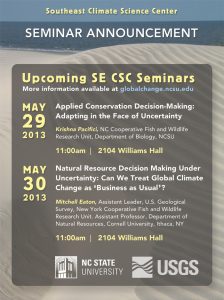May 29 & 30 – SE Climate Science Seminars
The SE Climate Science Center presents two seminars of interest to the public.
Both talks will take place in Williams Hall, room 2104, NC State University Main Campus. It is building #62 on the map.
May 29, 11 am
Applied Conservation Decision-Making: Adapting in the Face of Uncertainty
Krishna Pacifici, Research Project Coordinator, North Carolina Cooperative Fish and Wildlife Research Unit, Department of Biology, North Carolina State University
Abstract:
Climate change presents unique challenges to the management and conservation of natural resources. Climate change is a special case of system change that occurs both spatially and temporally at an uncertain and accelerating rate, which results in nonstationarity or the notion that environmental variation is driven by processes that are evolving over time. Viewing climate change as an additional, yet unique, source of uncertainty to be handled in adaptive management allows us a flexible and robust framework to confront and adapt to climate change. Conserving species in light of climate change becomes a daunting task as the synergistic effect of climate and landscape alterations put species, specifically rare or threatened ones, at higher risk. I present two methods that were developed to estimate species’ distribution and effects of landscape and environmental changes specifically for rare, spatially clustered populations. I suggest that these approaches are useful for informing conservation decision making and play a critical role in efficient monitoring. Because climate change impacts our conservation decisions at large scales and is inherently nonstationary, traditional approaches to finding an optimal solution are difficult. I describe recent work developing a framework for making decisions for large-scale spatially correlated decision problems with nonstationarity. I present an application based on the emergent infectious disease White-nose Syndrome (Geomyces destructans) in bats in the United States. This work is relevant for many other decision problems where climate change is thought to exacerbate the situation dramatically including wildlife/human diseases, invasive species, and landscape connectivity.
May 30, 11 am
Natural Resource Decision-Making Under Uncertainty: Can We Treat Global Change as ‘Business as Usual’?
Mitchell Eaton, Assistant Leader, U.S. Geological Survey, New York Cooperative Fish and Wildlife Research Unit. Assistant Professor, Department of Natural Resources, Cornell University, Ithaca, NY.
Abstract:
Making management decisions under the assumption of perfect knowledge about the factors and processes that influence resource dynamics is unrealistic and, worse, will likely lead to poor decisions. By recognizing the impacts of uncertainty on resource management, we can focus on applying the most appropriate tools for dealing with imperfect knowledge, which is essential in light of the uncertainty we face under climate change. Many existing approaches permit explicit incorporation of various forms of uncertainty into the decision process; these hold promise for making decisions that are less sensitive to unexpected events and enable us to formalize short-term learning for greater longer-term management gains. One rich set of methods for coping with uncertainty comes from decision theory, which is concerned with identifying values, system dynamics and uncertainties in order to select optimal decisions with respect to objectives. Applying decision analysis to complex problems is aided by breaking down the decision into its constituent elements, broadly classified as 1) the problem framework, including values, management constraints and alternative courses of action, 2) a model to capture system dynamics that links decisions to outcomes and 3) an analytical method to select the optimal decision or policy in order to maximize management utility. Climate change represents an extreme source of uncertainty that will impact many aspects of a decision process, including the ability to predict the future states of our managed systems. However, decision theory and alternative theoretic approaches offer the ability to address severe uncertainty in much the same way as other resource decision problems. I will introduce decision theory and the decision analytic approach and identify what components of a decision problem are likely to be most affected by climate change. I will discuss on-going work related to the challenges of managing habitat for the endangered Florida scrub-jay and a hypothetical problem of managing water resources in the face of sea-level rise to highlight the application of decision analytic approaches for advancing resource management given the reality of increased uncertainty under climate change.

- Categories:
